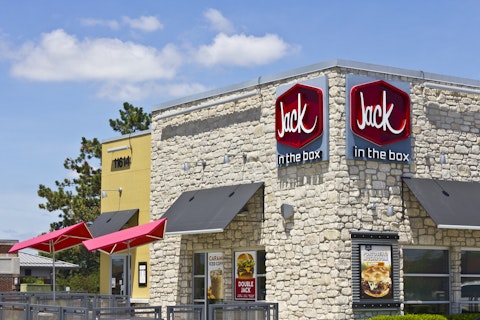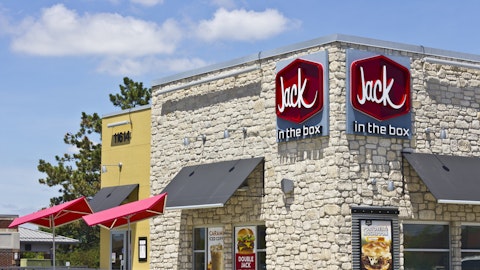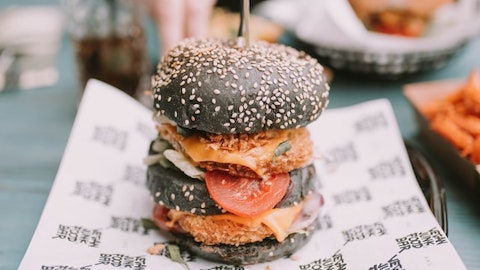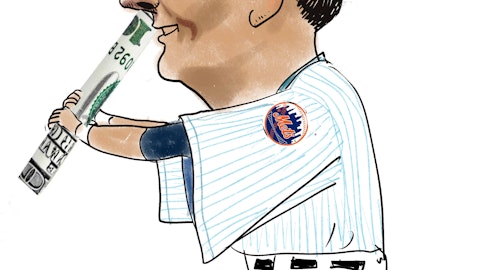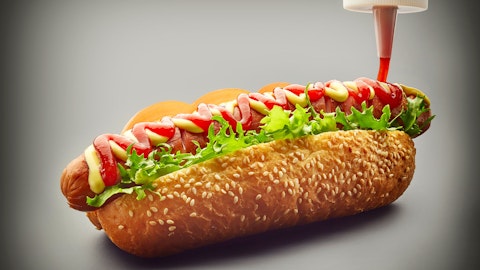Jack in the Box Inc. (NASDAQ:JACK) Q1 2023 Earnings Call Transcript March 1, 2023
Operator: Ladies and gentlemen, thank you for standing by. My name is Lisa, and I will be your conference operator today. At this time, I would like to welcome everyone to the Jack’s First Quarter 2023 Earnings Webcast. All lines have been placed on mute to prevent any background noise. After the speakers’ remarks, there will be a question-and-answer session. It is now my pleasure to turn today’s call over to Chris Brandon, Vice President of Investor Relations.
Chris Brandon: Thanks, operator, and good morning, everyone. We appreciate you joining today’s conference call highlighting results from our first quarter 2023. With me today are Chief Executive Officer, Darin Harris; and our Interim Chief Financial Officer, Dawn Hooper. Following their prepared remarks, we will be happy to take questions from our covering sell-side analysts. Note that during both our discussion and Q&A, we may refer to non-GAAP items. Please refer to the non-GAAP reconciliations provided in today’s earnings release, which is available on our Investor Relations website at jackinthebox.com. We will also be making forward-looking statements based on current information and judgments that reflect management’s outlook for the future.
However, actual results may differ materially from these expectations because of business risks. We, therefore, consider the safe harbor statement in today’s earnings release and the cautionary statements in our most recent 10-K to be part of our discussion. Material risk factors, as well as information relating to company operations are detailed in our most recent 10-K, 10-Q and other public documents filed with the SEC, and are available on our Investor Relations website. And with that, I would like to turn the call over to our Chief Executive Officer, Darin Harris.
Darin Harris: Thanks, Chris, and good morning everyone. Before I review our first quarter results and provide updates to our four strategic pillars, let me discuss some key takeaways from our first quarter of 2023. We delivered outstanding performance with respect to same-store sales, improved Restaurant and Franchise-Level Margin and adjusted EBITDA. Our restaurant operators, franchisees and team members are doing a phenomenal job of serving our guests and creating a better experience. I never want to miss an opportunity to publicly say thank you for their efforts. I’m grateful for you and I’m proud of how well you focused on executing the basics of the business, which has led to a strong start to the year. We continue to build momentum by driving operational excellence.
Our focus on staffing restaurants, training team members, expanding operating hours, improving speed of service, and reducing alerts, including the initiatives that support them are directly linked to our top-line sales performance. When combined with launching successful promotions, innovative products, and evolving into a more relevant digital brand, it gives me confidence we can price effectively and improve transactions. Among many other highlights we returned to positive net restaurant growth in Q1 with five net openings for Jack and one for Del Taco, which is a good start towards delivering positive net restaurant growth for the full year. I am pleased with the start to 2023, which only enhances our belief that this will be a big year for our company and the investments we are making in these two challenger brands are taking shape and leading to greater results.
Let’s now provide some updates on our four strategic pillars. We began with building brand loyalty and our efforts to grow sales and accelerate transactions led by our great marketing strategy, ensuring that Jack is cultural, relevant, authentic, visible and distinctive across all our customer touchpoints. Our new advertising agency, Chiat/Day, continues to help push the brand forward and more effectively connect with our core audience. In addition, along with our media partner Carat, we continue to optimize our media spin and maximize our reach. We have set this in motion with Jack and soon we’ll start seeing similar benefit for Del Taco in the upcoming quarters. Entering 2023, we established a strong 12 month calendar that will provide a balance between innovation, core and iconic favorites, utilizing guest insights to ensure we are offering guests what they want, when they want it, and how they want to get it.
The end result led by our hook-and-build strategy has been a material boost to same-store sales growth and equally as notable continued sequential improvement in traffic and transaction trends. In Q1, we’ve benefited from both a substantial innovation pipeline and an extensive product heritage that can be leveraged to energize our fan base and encourage frequency. We promoted core products, introduced new offerings, and opportunistically brought back past favorites, and this combination resonated by increasing frequency with our loyal guests and accelerated sales at all income ranges of our existing consumer base. During the quarter, we demonstrated this by bringing back our app we named Monster Tacos for Halloween, followed by promoting our core with the iconic Bacon Ultimate Cheeseburger and then the introduction of the new $10 Fan Favs platform.
Kicking off the new calendar year, we focused on promoting value via the debut of the Jack Pack combo starting at $5 and marketing a healthier option with the relaunch of a new and improved Deluxe Grilled Chicken Sandwich. We went beyond just food in Q1 and focused on another opportunity delivered by our guest insights. Enhancing our beverage offerings, including The Basic Witch Shake in October, followed by The Frozen Hot Cocoa Shake in November, but the biggest beverage news of the quarter was the January launch of our Red Bull-infusion line. Jack in the Box and Red Bull are a perfect collaboration while expanding our variety of caffeine based drinks. We’d see exciting news throughout the year in the beverage space for Jack. In fact, you might have seen this week our latest Mint Mobile Shake launch in partnership with actor Ryan Reynolds, these shakes and beverages are designed to build average check as part of our strategy along with trial and new guest acquisition.
Of course, building brand loyalty is not limited to our cravable menu items. It includes enhancing other touch points with a more modern Jack feel, updated menu boards, team member uniforms, packaging, and of course scaling our restaurant reimage program, which I will discuss shortly. The final key aspect of building brand royalty is through our digital channels and our digital transformation efforts. Q1 was our first full quarter with our new mobile app and web ordering. We leveraged this new digital platform in Q1 with 24 days of Jackmas featuring the epic deal lineup of exclusive offers for our Jack Pack Rewards loyalty members, and driving a 16% lift in loyalty sales during the program and leading to our largest digital sales week ever.
On an annual basis, we now generate $500 million in digital sales across Jack and Del Taco. And digital sales represent over 10% of our business at both brands, up from less than 1% in 2019. What encourages me most is that this is only the beginning and our new platforms and eventual POS deployment will strengthen the foundation towards making Jack a formidable and long-term digital competitor, where we can leverage our scale and resources to better use data and personalization across both brands. Now let’s move to our second pillar. Driving operational excellence, which is based on restaurants delivering an elevated guest experience on a consistent basis. We are focused on three areas. First, building the capability of our people and franchisees through training.
Second, elevating the requirements and standards of execution at the restaurant level. And lastly, simplifying our operations and menu through equipment, technology and process enhancements. Our staffing initiatives have proven to be highly effective and correlates the same-store sales in Q1. With most of the company restaurants, staffed fully and outpacing pre-pandemic levels. And franchisees now are within one hour of pre-COVID hours of operation. Once we staff our restaurants, it is just as important that our people have a great experience and are trained so that in turn they provide the same experience to our guests. We’re seeing record levels of engagement and certification in our restaurant that have implemented manager and team member requirements that has now reached 93% certification as of Q1.
This is translating to an improved guest experience as our service alert at Jack have been trending downward for the past five quarters and are currently at the lowest level in five years. Speed of service has also been improving steadily for the past three quarters and saw the first year-over-year improvement in several quarters during quarter one. We have now reduced second sequentially in back-to-back quarters. These service level improvements continue to support our top line results. Turning to simplification, we continue to implement our test restaurant level initiatives to reduce complexity or change product builds that can meaningfully improve efficiencies or cost pressures while also benefiting both guest and team member experiences.
We continue to explore fryer automation and we’ll be adding a second location later this year in Dallas. We’ve seen encouraging results and look forward to exploring further how this can enhance our operational capability, particularly as the new POS has rolled out and initiatives like this can become a reality. We’re also leveraging our Del Taco acquisition and learning from their automated voice AI ordering initiative that is yielding better upsell rates. Technology innovation such as automation and voice AI are a small part of our multi-year technology roadmap that is also focused on stabilizing core platforms and modernizing outdated legacy applications, unlocking restaurant opportunities to drive costs out, improve labor or service and grow profitability is predicated on having a modern cloud-based POS.
We continue to implement our plans to replace our current systems over the next year so we can turn our attention to more innovative solutions. Our third pillar, growing restaurant profit is centered on the financial fundamentals necessary to improve our four-wall economic model. As we have shared in the past, we now have a clear line of sight, 200 basis points of Jack margin reduction with potential savings of about $50,000 to $55,000 per restaurant, via equipment, process improvement and supply chain synergies, all of which will positively impact the guest experience and quality of our food. We’re also making meaningful progress on implementing the store level equipment, you have heard me discuss related with simpler operations and improve margins.
Notably our three in one toaster cheese pumps and Hydro-Rents machines. As of today, 50% of the system has installed the cheese pump while 50% of the system will have the Hydro-Rents installed by mid-April. Pricing discipline is critical to mitigating inflationary impacts. And this is an area we have significantly advanced in the last year under the new management team. Our investment in people and more sophisticated analytical tools are helping us to be more strategic, surgical and competitive in our pricing. We have identified pricing opportunities by store, channel and market, plus product relationships that our franchisees can now utilize for smarter decisions. Financial fundamentals, pricing opportunities and acquisition synergies are in place to keep enhancing the economic model so that it’s more compelling for franchisees hope in restaurants and thereby grow and expand our reach.
The all-important fourth and final pillar. Starting essentially from scratch, we have built our new restaurant pipeline by accelerating existing and new development commitments, and approving more sites over the past year than we did in the prior three years. Both brands have also leaned in heavily on new flexible restaurant prototypes. For example, let’s briefly discuss some preliminary results at our newest Jack prototype, the drive-thru only location that opened in Tulsa, Oklahoma in the fourth quarter. This restaurant is outperforming our expectations at approximately $50,000 per week and has sustained over 85% of its opening sales performance or months later. It is also generating 20% of the sales through digital channels. This restaurant benefits from a new more efficient in kitchen configuration as well as the equipment upgrades mentioned earlier.
It also employs the Wyoming drive-thru and will soon have food pickup lockers to assist with carryout, digital and third-party delivery orders. In quarter one, Jack in the Box executed four new development agreements for a total of 36 future restaurant commitments. Recent signings include St. Louis’ expansion, double-digit commitments for both Hawaii and Nashville, and I’m thrilled to announce today completing agreements for Jack to enter Florida and Arkansas. Three of these deals include new franchisees to our system, which make up the first new franchisees in the Jack in the Box system in over a decade. The brand has never been in Arkansas in its 70 year history that has been over 30 years since our brief and relatively small presence in Florida in the 70s and 80s.
This is a significant development and milestone for our business and we are excited for the first stores to eventually open in these new markets. All said, as of the first quarter and since the launch of the development program in mid-2021, the company has signed 72 agreements for a total of 303 restaurants. These development agreements are now beginning to translate into openings as our growth engine starts to gain momentum. We’ll be entering two new markets this year for Jack through a combination of company and franchise resources. Franchisees will open in Salt Lake City this summer and company-owned restaurants in this market will follow shortly thereafter. We will then enter Louisville, which will begin as a company-owned market. Our reimaging program is garnering great participation from our franchisees since the official launch last summer.
There are currently 589 restaurants submitted by franchise owners to participate, and 47 of these are now in the design and permitting stage. For company-owned restaurants, we have approved 12 stores to test the brand new Crave reimage and we’ll have three completed by the end of the fiscal year across Dallas and Los Angeles. We look forward to updating you on the progress and performance of these restaurants. In evaluating our recent remodel performance, which we define as those restaurants have had remodeling activity over the course of the last two years, we are seeing an absolute average net sales lift from pre to post-remodel of nearly 14%, which is over 8% higher than non-remodel control locations during the same timeframe. We believe that remodeling will continue to build and have even more impact as consumer traffic and commute patterns return to more pre-COVID norms.
One quick comment on St. Louis, a challenge market where 17 franchise restaurants closed last year. In quarter one, the 47 remaining locations experienced 10.1% increase in total sales despite being down in unit count and on a per store basis, comp sales rose 25.5% and transactions rose 9.8% versus the prior year. The bottom line is our market optimization strategy is working here. The franchise business is healthier, and now we have commitment to build new restaurants in the area. In summary, the progress we’re making on all four pillars of our strategy helped by a great financial start in Q1 is a big part of why we are excited about 2023 being a truly transformational year for our business. Turning briefly to Del Taco, the brand’s highly relevant positioning and barbell menu strategy provides compelling value and affordability across the menu.
The category-leading 20 Under $2 platform was designed to help achieve additional price on high velocity value items, while maintaining value and affordability perception. The center of the plate items such as tacos, burritos, quesadillas, and beverages to name a few, provide tremendous value options for guests that look to either trade down or add on to their orders. 20 Under $2 continues to be well received at roughly 16% mix during non-promotional periods and north of 18% went on primary message. On the other side of the barbell, we seek to reduce the amount of potential check impact by promoting premium items such as our Epic Fresh Guacamole Burrito. It delivers quality and value to meet both consumer needs. In Q1, we promoted the new Torta platform that launched in Q4 last year, then shifted to a Tamaledays deal with Torta as a secondary message.
And the new Del Yeah! Rewards program launched in fall of 2021 and it now has 1.2 million members. This is a points-driven loyalty program with four elite tiers, including the ability to order through the app. Throughout Q1, we also improved our app offers and drove additional visits, use and engagement from our users. As membership continues to grow in these programs, Del Taco will leverage the ability to target guests and increase spend and frequency. Operationally, we’re heavily focused on recruitment as well as expansion of operating hours to help meet top line potential. We’re seeing labor availability increase in most of our geographies, but have also increased wages in order to ensure staffing for our graveyard shift. Reinstated operating hours are now above 2021 levels with some additional initiatives in place designed to return us to pre-COVID hours as soon as possible.
Del Taco’s Fresh Flex prototype, which initially opened more than a year ago in Orlando has similarly exceeded our sales projections at $50,000 in sales per week. We’re getting excellent feedback from both customers and store team members. I visited this location this past January during ICR. I was not only incredibly impressed with the, look, food and service, but as important the enthusiasm from store team members and guests. This attractive new Fresh Flex building is helping us drive interest and momentum for franchisee growth. We have assigned 13 development agreements with new franchisees since 2021, delivering 89 restaurant commitments across 12 total states providing a starting point for future system growth. And in this quarter, Del Taco executed two new development agreements for a total of 10 future restaurant commitments, continuing its expansion within Florida, with signings in Tampa and the Palm Beach areas.
In addition to the Orlando location mentioned earlier, our second Fresh Flex location open in the Tampa market and it’s doing $45,000 a week in sales. Additionally, we have a drive-through only version of the prototype currently under construction in New Mexico, which is expected to open around April. And lastly, on the re-franchising front, we completed a transaction for 16 Del Taco units in California to an existing Jack in the Box franchisee. Heavy demand and highly accretive transactions could increase our previously stated share repurchase potential. We anticipate re-franchising transactions to be fairly active in 2023 since receiving several viable offers to purchase existing restaurants as well as build new Del Taco locations in existing and new markets.
We’ll continue to update on this regularly throughout the year and we anticipate a heavier number of completed deals in 2023 at early 2024 within the overall three-year target we provided in January. In closing, I am very pleased with the start to the year and I look forward to continuing to update you along the way in 2023 as our strategies, investments, and growth objectives deliver real results. Before taking some questions, I’d like to turn the call over to our Interim CFO, Dawn Hooper. Dawn?
Dawn Hooper: Thanks, Darin. My commentary today will begin with a discussion of our two brands individually followed by detail on our consolidated performance and capital allocations. Beginning with Jack in the Box, same-store sales growth in Q1 was 7.8% consisting of company owned comps of 12.6% and franchise comps of 7.4%. On a two-year basis, same-store sales growth for the quarter was 9%. Our same-store sales breakdown included pricing of 10%, a sequential decrease of 40 basis points compared to Q4 last year, a 1.1% decrease in transactions, a 380 basis point improvement compared to Q4 and a 1.1% decrease in mix, a 50 basis point improvement compared to Q4 last year. System-wide transactions were bolstered by a relevant calendar, strong marketing and improved operations.
We especially saw strong results coming from locations that have significantly improved their average operating hours while company owned transactions were resoundingly positive up 4.9%. Despite the inflationary environment, our hook-and-build strategy combined with our ability to leverage our variety of products in a culturally relevant barbell strategy improving effective with improving sequential transaction and mix trends for the second quarter in a row. In fact, Jack in the Box saw two-year sales strength at both the top and bottom deciles of our household income demographic suggesting success in servicing both value and non-value customers. During the quarter, nearly all product categories and day parts generated positive sales. However, dinner and late night were the real standouts with late night posting positive transactions.
Our potential to dominate the state part is progressing, helped by expanding operating hours, simplified operations and compelling menu platforms that appeal particularly to consumers during these timeframes. Notably, our munching meal platforms. Restaurants with dining rooms opened and in use at quarter end was just over 65% of the total system up from 60% last quarter. In addition, the average hours per day with open dining rooms continues to increase with Q1 gaining approximately three minutes on average compared to Q4 last year. As of Q1, approximately 70% of locations system-wide had their dining rooms open 12 hours or more a day while just over 96% had dining rooms open for at least five hours a day. On average dining rooms system-wide were opened nearly 13 hours per day.
Our company owned stores continue to outpace franchise stores, but franchisees are catching up as they recognize and appreciate the notable sales lift that open dining rooms provide to their restaurants. Turning to restaurant count, there were six Jack in the Box franchise openings in Arizona, Texas, California and Nevada, and one company closing in San Diego resulting in a quarter end restaurant count of 2,186 restaurants. As Darin already discussed, we have a strong development pipeline and are anticipating returning to positive net unit growth this year for the first time since 2019. Regarding our Jack restaurant level margin, the impact of our two remaining evolving markets and commodity inflation remained headwinds to performance, but we were still able to expand margin performance in the first quarter.
Q1 margin increased 150 basis points to 19.8% compared to 18.3% in the same period a year ago. And when excluding the two remaining evolving markets, our restaurant level margin would’ve been 21.1%. Food and packaging costs as a percent of company owned sales rose 150 basis points to 32.8%. This was due primarily to a commodity inflation of 15.5%, which was up from 14.9% in Q4 last year. Increases were experienced across nearly all categories except for pork, with the greatest impact seen in produce, sauces, potatoes, oil, cheese, and bakery. Most of the cost with offset by price increases and to a lesser extent more favorable food waste. Labor as a percentage of company owned sales was down 180 basis points due to price increases and the benefit of refranchising Oregon in Q4 last year and was partially offset by wage inflation of 9.9% compared to the prior year.
Recall that due to the tight labor market and in order to attract and retain team members, we executed a substantial wage increase beginning in Q2 last year. About 70% of Jack in the Box restaurants system-wide operated at reduced operating hours, a slight improvement from the previous quarter. Occupancy and other operating costs decreased 120 basis points to 16.2% of restaurant sales, due to leverage from higher sales and the Oregon refranchising benefit, partially offset by higher costs for utilities, delivery fees and other operating expenses. Restaurant level margin was 44.4% or $106.8 million, a $13.4 million increase compared to the prior year helped by higher royalty and rent contributions. About half of the $13.4 million increase was due to the Hawaii transaction with the balance related to flow through from higher sales and lower cost for bad debt expense.
When backing out the impact of the Hawaii transaction, franchise level margin would’ve still been 42.8% for the quarter, 120 basis points higher than the prior year of 41.6%. Turning now to Del Taco. Same-store sales rose 3%, consisting of company owned comps of 3.1% and franchise comps of 2.8%. There were positive sales results across all major geographies with particular strength across the non-California franchise footprint. All dayparts were positive and comp growth was led by the late night daypart boosted by the expansion of operating hours and delivery orders, which over-index at late night. Staffing improvements have led to operating hours now running above 2021 levels with continued opportunity to return to pre-COVID hours as we move forward.
Del Taco’s same-store sales right now included pricing of 11.9% down 30 basis points sequentially from Q4 2022, a decline in transactions of 5.8% equal to Q4 and a mix decline of 2.7% down 230 basis points sequentially from Q4 2022. The negative mix shift and sequential decrease was largely driven by smaller party sizes. Substantially, all dining rooms are open and have experienced increased demand as dining room sales represented over 5.7% of total sales in Q1, up from 5.5% in Q4 last year. Drive-through sales mix is now in the low-70% range down from the mid to high-80% range during the height of COVID. While total delivery in mobile are now mixing at nearly 11% of sales. There were two Del Taco openings during Q1 in Florida and New Mexico and one closure in Nevada.
In December, we refranchised 16 restaurants in California to an existing Jack in the Box franchisee. The Del Taco restaurant count at quarter end was 591 restaurants. Del Taco restaurant level margin was 16.1% compared to 17.3% in the prior year due to food and OpEx inflation outpacing menu price and sales growth. Despite the decline in restaurant level margin, the P&L has been well managed in light of the food, labor and utility inflation. Total labor and related costs reflected modest leverage during Q1 helping to limit the amount of overall margin contraction. Looking ahead, we see continued food and OpEx inflation with labor continuing to post modest leverage due to elevated pricing and slowing wage inflation. Food and packaging costs rose 140 basis points to 28.2%.
Food inflation was approximately 17% in Q1 outpacing recent menu price increases. Labor as a percent of restaurant sales decreased 100 basis points to 34.2% of restaurant sales. Average wage inflation was approximately 4.7% in Q1 lower than recent menu price increases. This along with strong labor controls and efficiencies drove modest leverage on the labor line. Turning to occupancy and other operating expenses. These costs increased 90 basis points to 21.6% driven by utility inflation, continued growth and delivery resulting in higher delivery fees as a percentage of sales, as well as an increase in maintenance and repair costs. Franchise level margin was $6.4 million or 39.6% of franchise revenues and virtually unchanged from the prior year as the benefits from higher sales were offset by an increase in franchise support costs.
Shifting now to our consolidated results. Consolidated SG&A was $50.1 million, including approximately $18 million related to the addition of Del Taco in the current year, broken down as $12 million of Del Taco G&A and $6 million of Del Taco advertising. Excluding net COLI gains, G&A was 2.7% of total system-wide sales or 2.3%, excluding a $6.4 million legal verdict charge. Consolidated adjusted EBITDA was $110.6 million up from $91.2 million in the prior year, due primarily to higher Jack franchise and restaurant level margins partially offset by higher G&A. Del Taco contributed $12.4 million to our Q1 adjusted EBITDA results this year. Consolidated GAAP EPS came in at $2.54 compared to $1.85 in the prior year. Operating earnings per share, which includes certain adjustments came in at $2.01 for the quarter versus $1.97 in the prior year.
Note that the effective tax rate for Q1 was 26.7% compared to 26.5% a year ago. Moving to capital allocation. In Q1, we repurchased 220,000 shares for $15 million as part of our ongoing share repurchase programs. And with the additional proceeds received from the Del Taco refranchising transaction in Q1, we now plan on executing up to $60 million in share repurchases this year. We currently have $160 million remaining under a Board authorized buyback program. In light of our strong cash position and in consideration of increasing interest rates, during the year we also plan to pay down the $50 million outstanding on our revolving facility. $25 million of this will be paid in the second quarter and we will keep you updated on the payment timing of the remaining balance.
Beyond share repurchases and paying down debt, we will also continue investing in the future of our brands and returning excess cash to shareholders through dividends. Lastly, note that all annual guidance measures for 2023 provided at our November earnings call remain the same. As per usual, any updates to these measures if needed will take place at our Q2 earnings call in May. To conclude, we thank everyone across Jack and Del Taco for their contributions to our Q1 results and for what they are doing to help execute against our four strategic pillars. We remain highly optimistic by what we can accomplish this year as we unlock the combined power of our brands. Thanks for your time today. And operator, please open the line for some questions.
See also 16 Best Consistent Dividend Stocks to Buy and 10 Most Promising Psychedelic Stocks .
Q&A Session
Follow Jack In The Box Inc (NASDAQ:JACK)
Follow Jack In The Box Inc (NASDAQ:JACK)
Receive real-time insider trading and news alerts
Operator: Thank you. We’ll take our first question from Brian Bittner with Oppenheimer & Company.
Brian Bittner: Thanks. Good morning and congratulations on the business update. As it relates to net unit growth, I’m just €“ I’m trying to understand Darin, how big of a turning point the first quarter could represent for the Jack in the Box net unit growth moving forward. Obviously the franchise system had zero closings in the first quarter, which we haven’t seen in a long time. Openings accelerated, you announced the big news particularly about Florida. So was this indeed a quarter where there’s a signal of a big turning point on the closings and the net unit adds? Or was there more of a timing benefit how things added up this quarter? And I have a follow-up too. Thanks.
Darin Harris: Sure. Good to hear from you Brian. The way I think about it, one, let’s just talk about Florida and Arkansas. We’re incredibly excited about the strategies we put in place to expand Jack’s reach. And as we’ve shared many times, our focus was getting our existing franchisees moving forward, optimizing the system, doing the things we need to do to prepare them for growth. And now we’re starting to attract the new franchisees as we switched our focus. So long story short, as we think this is part of the turning point that we’ve been talking about for the last couple of years is focusing on how do we return to net unit growth on a consistent basis. We continue to remind our shareholder community and all of our investors that development agreements are a lead indicator for preparing a pipeline.
And Jack has added 72 agreements for the 303 restaurants and now we’re measuring that with Del. And Del has done a nice job and our team’s there adding 14 agreements for 91 restaurants. And so I think this is part of the story that we’ve been saying there’s lead indicators here that are pointing to the future.
Brian Bittner: Okay. And just my follow-up is on the same-store sales. Your 2023 same-store sales guidance for Jack in the Box is low-single-digits for the year. You obviously just banked the first quarter close to 8%. So the question is, is this still the right way to think about the year? I know you have an updated guidance. But should we anticipate the same-store sales trend to be more at the low-single-digit range starting in 2Q and beyond, or is this guidance starting to tilt a bit conservatively?
Darin Harris: So, typically we look to provide an update to our annual guidance sometime in May €“ at our May update. And so our focus right now is get the first quarter in the books and measure our business according to the key lead indicators. And at this point, one of the lag indicators is that same-store sales momentum continues to be strong into quarter two.
Brian Bittner: Okay, thank you so much.
Operator: We’ll take our next question from Lauren Silberman with Credit Suisse.
Lauren Silberman: Thank you very much and congrats on the quarter. Would you be willing to provide an update on franchise unit profitability in 2022 and just given all the work you’re doing with restaurant margins, how can we think about unit economics in 2023?
Darin Harris: Hi Lauren. The way I think about our franchise level economics right now is that, all of us in the industry have been faced with these dramatic headwinds with commodities. And we’re not able to take enough price in the near-term to overcome it. So we’ve €“ if we look at our business, our franchisees are still at the level of cash profitability, not percentage that they were prior to the pre-pandemic or pre-pandemic. So now it’s about time, it’s recouping that through price. It’s also recouping some of that margin that we had record levels of that we reported in 2021. We have to recoup that through price. We have to continue to do it through transaction. And then we’ve also talked about our strategy around financial fundamentals, where we think there’s a bridge to 200 basis points. We’ll continue to look at top-line drivers with digital and then also, all the things we’re doing to staff our restaurants, well that ultimately will lead to it.
